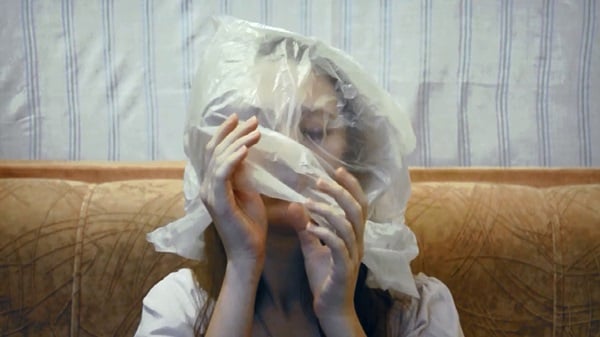
Image: Courtesy the artist and Gold + Beton.
As Germany struggles to come to terms with horrifying sexual attacks during New Year’s Eve celebrations in Cologne, where over 200 cases of assault were reported, an exhibition called “Exquisite Corpse” aims to confront assumptions regarding the female body.
The show brings together the work of 11 female artists, each one posing the question: Why is the male gaze still dominant? Last year, for example, artist Rupi Kaur’s self-portraits were banned by Instagram because they showed a fully-clothed woman with menstrual blood stains on her crotch and mattress. She wrote, “Thank you @instagram for providing me with the exact response my work was created to critique.”
It seems ironic that the exhibition, which runs from January 22 until February 7, opens a few weeks after local police blamed women during the New Year’s Eve celebrations for putting themselves in danger. It all makes you wonder, is the show’s opening some kind of instant karma? Is this kismet operating on a grand scale?
Poppy Jackson, Impossible (2014).
Image: Courtesy the artist and Gold + Beton.
Performance artist Poppy Jackson’s contribution to the show is a film of her work Constellation, involving her own and other women’s menstrual blood.
Exposing this reproductive taboo has always given rise to controversy. In 1972, Judy Chicago and Miriam Schapiro worked with the Feminist Art Program at the California Institute of the Arts to produce the site-specific installation “Womanhouse.”
Chicago’s contribution to the show, Menstruation Bathroom, featured a waste bin of used tampons behind a veiled doorway. At the time, some visitors were outraged, while others treated the work as an attention-grabbing stunt.
“I think that when there is a discomfort about such pieces that try to speak the truth about ‘difficult’ issues,” Jackson writes in an email interview. “Trying to turn them into a joke is an easy way for people to attempt to disregard something that has hit a nerve.”
Rupi Kaur, Period (2015).
Image: Courtesy the artist and Gold + Beton.
Other powerful connections to the feminist oeuvre are present in the show, in works by Kate Durban, Julia Kim Smith, and Anastasia Vepreva.
“Barbara Kruger’s statement that your body is a battleground is as relevant today as ever,” Sarah Faraday, the curator and founder of Fuse Artspace in Bradford, writes in an email interview. “The demands and expectations laid upon the sexualized, infantilized and fetishized female paradigm seem tiringly endless.”
Faraday’s own work explores the objectification and appropriation of the female form, from raw pornography to popular advertisements.
“There has never been a more necessary time than the present for such an exhibition and it’s really exciting to be involved.” Jackson writes. “It’s awful and shocking that this level and type of violation of women’s’ bodies in Cologne … was viewed at all as something that should ever be kept quiet, under any circumstances.”
The oppression women experience is global, and the recent events in Cologne have brought this fact to the world stage once again. We can only hope that by examining these issues and raising consciousness, this city can move forward honestly, and openly.
“Exquisite Corpse” is on view from January 22-February 7 at Gold + Beton in Cologne, and includes works by Julia Kim Smith, Anastasia Vepreva, Sarah Faraday, Evelin Stermitz, Kate Durbin, Lacie Garnes, Faith Holland, Sheena Patel, Rupi Kaur, and Poppy Jackson.